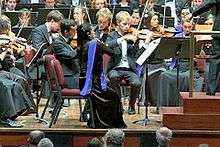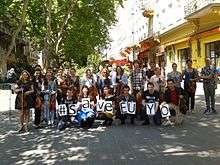European Union Youth Orchestra
The European Union Youth Orchestra (EUYO) is a symphony orchestra with members drawn from each of the European Union's 27 Member States and the United Kingdom. Described by the Guardian as having “gripping, exhilaratingly good orchestral playing, surging with energy, laser-sharp focus and collective daring... [and] a technical prowess that is downright terrifying”,[1] it connects music colleges and the professional music world for generations of European musicians since its foundation in 1976.
| European Union Youth Orchestra | |
|---|---|
| Orchestra | |
 The EUYO performing in Washington, DC, United States in April 2012 | |
| Founded | 1976 |
| Location | Ferrara, Italy |
| Principal conductor | Vasily Petrenko |
| Website | www |

History
Founded by Joy and Lionel Bryer in 1976, the EUYO has been a Cultural Ambassador for the European Union for 40 years. The EUYO's Honorary Patrons include the Heads of Government of all of the EU's Member States, the President of the European Commission and the President of the European Parliament.
The Orchestra has worked with many of the world's greatest musicians including Daniel Barenboim, Leonard Bernstein, Sir Colin Davis, Herbert von Karajan, Mstislav Rostropovich and particularly its three Music Directors and current Chief Conductor: Founding Music Director Claudio Abbado, former Music Director Vladimir Ashkenazy, former Music Director and current Conductor Laureate Bernard Haitink and Chief Conductor Vasily Petrenko.
The EUYO has performed in most of the world's major concert halls, notably at the Royal Albert Hall, the Musikverein, Carnegie Hall and the Boston Symphony Hall. From Amsterdam to Abu Dhabi, Moscow to Mumbai, Seoul to São Paulo - 4 Continents, 43 countries, 177 cities and 224 venues thus far.
The EUYO's 3,000 alumni have all come through the Orchestra's rigorous, annual audition process conducted in all (currently 28) EU Member States, and many are now notable conductors, soloists, teachers, and instrumentalists working with major orchestras in the world, including the London Symphony Orchestra, the Berliner Philharmoniker, the Boston Symphony Orchestra, and the Royal Concertgebouw Orchestra. The EUYO's Summer Home and Principal Venue Partner is Grafenegg, where both organisations launched the European Music Campus in 2014.
In 2014, the Orchestra embarked on an innovative partnership programme — Towards 2020 — which brings together eleven cultural and commercial organisations from ten EU countries, and thirty-five associate organisations from Europe and around the globe including Global partners in Brazil, China, India and the US. The project was co-funded by the EU's ‘Creative Europe’ cultural funding programme in its first phase and aims at establishing a new model to skill talented young orchestral musicians from all 28 EU Member States in a manner that responds to the changing needs of 21st-century audiences and society. T2020 involves the Orchestra in innovative training prototypes, performance programmes, digital platforms and audience models, all designed to enable cultural development, career opportunities and audience development strategies that are transferable to other cultural and creative sectors.
On 12 May 2016, the European Union Youth Orchestra announced that was to cease operations from September 2016 due to a lack of future funding from the European Union.[2] However, the news attracted extensive support around Europe, where campaigns and flashmobs took place and many conductors and artists including Antonio Pappano, Gustavo Dudamel and Daniel Barenboim put their names to a statement supporting the Orchestra's work.[3] On 31 May 2016, an official press announcement from the EU's council of Ministers and Commission confirmed that President Jean-Claude Juncker had ordered three commissioners to find funding for the EUYO. On 1 June 2016, President Juncker announced a proposal to enable the European Union to return the EUYO to core funding.[4]
Relocation to Italy and Brexit
The orchestra announced in October 2017 that, as a result of Brexit, it intended to relocate from London to Italy. It was therefore initially expected that British youth would cease to be eligible for the institution.[5]
The EUYO moved to Ferrara, Italy during the course of 2018. Its current headquarter is the opera house Teatro Comunale Claudio Abbado located in the centre of the city[6].
The transitional agreement between the European Union and the United Kingdom allows for players from the United Kingdom to still be eligible to apply and perform with the EUYO until December 2020. The funding required to enact this provision was dependent on the UK leaving the EU with a deal before the final Brexit deadline. Therefore, in the case of a no-deal Brexit, British citizens would have no longer been able to be part of the EUYO.[7]
Music Directors
- Claudio Abbado 1976–1994
- Bernard Haitink, 1994–2000
- Vladimir Ashkenazy, 2000–2015
- Bernard Haitink (Conductor Laureate) and Vasily Petrenko (Chief Conductor), 2015
Orchestra Board
- Ian Stoutzker, CBE, FRCM, Hon.FRAM, FRWCMD – Orchestra Board Chair, Trustee and Co-Chair
- Sir John Tusa – Trustee, Co-Chair
- Martijn Sanders – Trustee
- Anthony Sargent, CBE – Trustee
- Marshall Marcus, CEO
Former conductors
Among others: Claudio Abbado, Vladimir Ashkenazy, Daniel Barenboim, Leonard Bernstein, Herbert Blomstedt, James Conlon, Sir Colin Davis, Antal Doráti, Carlo Maria Giulini, Ivan Fischer, Bernard Haitink, Herbert von Karajan, Rafael Kubelík, Erich Leinsdorf, Lorin Maazel, Zubin Mehta, Gianandrea Noseda, Vasily Petrenko, Kurt Sanderling, Gennady Rozhdestvensky, Mstislav Rostropovich and Sir Georg Solti.
Former soloists
Among others, the EUYO has performed with Salvatore Accardo, Martha Argerich, Vladimir Ashkenazy, Emanuel Ax, Teresa Berganza, Yefim Bronfman, Renaud Capuçon, Gautier Capuçon, Kyung Wha-Chung, Robert Cohen, Diana Damrau, Plácido Domingo, Isabelle Faust, Bernarda Fink, Dietrich Fischer-Dieskau, Sir James Galway, Angela Gheorghiu, Matthias Goerne, Susan Graham, Natalia Gutman, Lynn Harrell, Barbara Hendricks, Daniel Hope, Janine Jansen, Leonidas Kavakos, Nigel Kennedy, Evgeny Kissin, Christa Ludwig, Radu Lupu, Karita Mattila, Lord Yehudi Menuhin, Midori, Shlomo Mintz, Viktoria Mullova, Anne-Sophie Mutter, Jessye Norman, Murray Perahia, Itzhak Perlman, Francesco Piemontesi, Maria João Pires, Mikhail Pletnev, Margaret Price, Maurizio Pollini, Vadim Repin, Ravi Shankar, Arabella Steinbacher, Christian Tetzlaff, Alisa Weilerstein, and Pinchas Zuckerman.
See also
References
- Molleson, Kate (2015-08-26). "EUYO Noseda at Edinburgh festival review – extraordinary energy and technical prowess". The Guardian. ISSN 0261-3077. Retrieved 2016-02-08.
- EUYO.eu Archived 2016-05-16 at the Wayback Machine
- Rhinegold.co.uk
- EUYO.eu
- Brown, Mark (11 October 2017). "EU youth orchestra to quit UK for Italy over Brexit". The Guardian. London. Retrieved 11 October 2017.
- "EUYO: Contact information". www.euyo.eu. Retrieved 2019-09-28.
- "EUYO: Frequently Asked Questions". www.euyo.eu. Retrieved 2019-09-28.